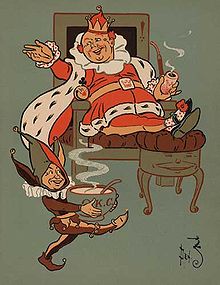Old King Cole
| "Old King Cole" | |
|---|---|

Illustration by William Wallace Denslow
|
|
| Nursery rhyme | |
| Published | 1708-9 |
"Old King Cole" is a British nursery rhyme first attested in 1708. Though there is much speculation about the identity of King Cole, it is unlikely that he can be identified reliably as any historical figure. It has a Roud Folk Song Index number of 1164. The poem describes a merry king who called for his pipe, bowl, and musicians, with the details varying among versions.
The most common modern version of the rhyme is:
Old King Cole was a merry old soul,
And a merry old soul was he;
He called for his pipe, and he called for his bowl,
And he called for his fiddlers three.
Every fiddler he had a fiddle,
And a very fine fiddle had he;
Oh there's none so rare, as can compare,
With King Cole and his fiddlers three.
The song is first attested in William King in his Useful Transactions in Philosophy in 1708–9.
King's version has the following lyrics:
Good King Cole,
And he call'd for his Bowle,
And he call'd for Fidler's three;
And there was Fiddle, Fiddle,
And twice Fiddle, Fiddle,
For 'twas my Lady's Birth-day,
Therefore we keep Holy-day
And come to be merry.
It is unlikely that the King Cole of the nursery rhyme can be identified with any particular historical person.
William King mentions two possibilities: the "Prince that Built Colchester" and a 12th-century cloth merchant from Reading named Cole-brook. Sir Walter Scott thought that "Auld King Coul" was the father of the giant Fyn M'Coule (Finn McCool).
It is often noted that the name of the legendary Welsh king Coel Hen can be translated 'Old Cole' or 'Old King Cole'. This sometimes leads to speculation that he, or some other Coel in Roman Britain, is the model for Old King Cole of the nursery rhyme. However, there is no documentation of a connection between the fourth-century figures and the eighteenth-century nursery rhyme.
Further speculation connects Old King Cole and thus Coel Hen to Colchester, but in fact Colchester was not named for Coel Hen. Connecting with the musical theme of the nursery rhyme, according to a much later source, Coel Hen supposedly had a daughter who was skilled in music, according to the highly unreliable Geoffrey of Monmouth, writing in the 12th century.
...
Wikipedia
